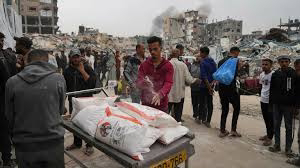The Gaza Strip is facing what humanitarian officials are calling one of the most catastrophic crises in modern history.
As Israeli military operations intensify and infrastructure crumbles, over two million Palestinians are trapped in a spiraling emergency marked by famine, thirst, and relentless violence.
In recent weeks, the situation has deteriorated dramatically. According to UNICEF, Gaza is plunging into a man-made drought, with only 40% of drinking water facilities still operational.
Children are dying from dehydration, and the United Nations warns that the region is on the brink of famine.
The World Food Programme reports that food diversity has collapsed, and prices for basic goods have skyrocketed beyond reach.
The humanitarian aid system, once a lifeline, is now a source of chaos. The Gaza Humanitarian Foundation (GHF), a U.S.- and Israeli-backed initiative, has come under fire for its failure to safely distribute aid. Since May 27, over 400 Palestinians have been killed while trying to access food at GHF sites.
Eyewitnesses recount scenes of desperation—families walking miles only to be met with gunfire or misinformation about aid availability. In one tragic incident, a young boy wounded by a tank shell died after waiting hours for medical help that never came.
Fuel shortages have crippled hospitals and water systems. UNRWA reports that nearly half of essential medical supplies are out of stock, and communications infrastructure is collapsing due to lack of power.
Aid convoys are routinely blocked or looted, and even when food enters Gaza, it often never reaches its intended recipients.
The international response has been mixed. While some nations call for ceasefires and humanitarian corridors, others remain silent or complicit.
Activists like Greta Thunberg have attempted to deliver symbolic aid by sea, only to be intercepted and detained by Israeli forces in international waters—raising questions about maritime law and the limits of humanitarian intervention.
Meanwhile, civil society movements like the Global March to Gaza are gaining momentum, demanding an end to the blockade and military aggression. Their message is clear: the world cannot stand by as Gaza starves.
As the death toll rises and hope dwindles, Gaza’s crisis is no longer just a regional issue—it’s a test of global conscience. Will the world act before it’s too late?














.jpg)
.jpg)




0 Comments